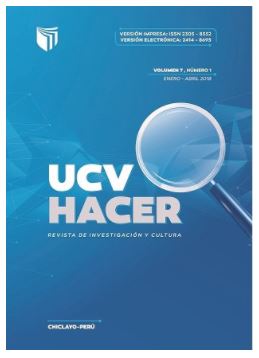Stabilization of non-cohesive granular soils of Lambayeque applying calcifying bacteria
DOI:
https://doi.org/10.18050/RevUCVHACER.v9n2a4Keywords:
Soils, Bacteria, Biotechnology, Calcium calciteAbstract
The non-cohesive granular soils of the Lambayeque region have physical and mechanical characteristics that hinder the design and construction processes of the various infrastructures that run on it, which is why applying calcifying bacteria sought to improve their properties in order to stabilize it. For this process, the inductive method will be used applying the experimentation and knowledge in biotechnology, using samples of SP-type soils extracted within the Lambayeque region and those that were sometimes subjected to various tests in the natural state and applying calcifying bacteria that allow the recognition of results expected. The parameters that affect soil stabilization are: decrease empty spaces, permeability and increased cohesion, which were achieved due to the precipitation of calcium carbonate resulting from the action of calcifying bacteria in the environment where they were inoculated its presence from 0,32 to 5,44% as maximum value in the samples of the province of Chiclayo, and the alkalinity of the soil increased in a range of 3,85 to 9,37%. The values obtained in relative specific weight increase from 9,5 to 13,5%, which indicate the decrease of the empty spaces, in the same way the permeability manifests a decrease of 9,5 to 22,7% and also the cohesion increased from 0,074 to 0,1703 and from 0,0022 to 0,1632. The flexibility of calcifying bacteria improves physical and mechanical properties ensuring the stability of non-cohesive granular soils in the Lambayeque region.
Downloads
Published
How to Cite
Issue
Section
License

This work is licensed under a Creative Commons Attribution-NonCommercial-ShareAlike 4.0 International License.










